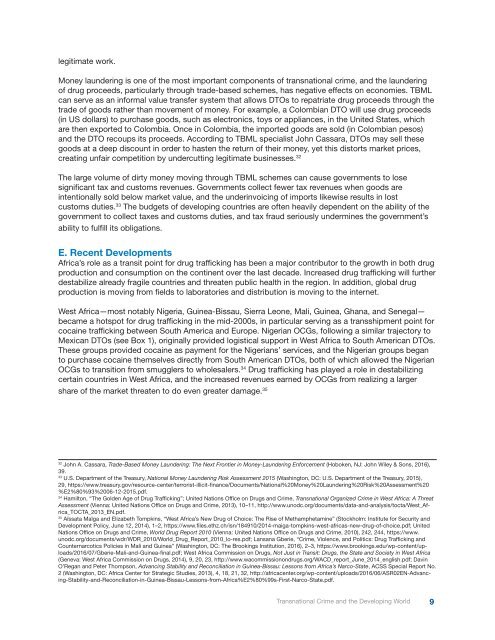Transnational Crime and the Developing World
Transnational_Crime-final
Transnational_Crime-final
You also want an ePaper? Increase the reach of your titles
YUMPU automatically turns print PDFs into web optimized ePapers that Google loves.
legitimate work.<br />
Money laundering is one of <strong>the</strong> most important components of transnational crime, <strong>and</strong> <strong>the</strong> laundering<br />
of drug proceeds, particularly through trade-based schemes, has negative effects on economies. TBML<br />
can serve as an informal value transfer system that allows DTOs to repatriate drug proceeds through <strong>the</strong><br />
trade of goods ra<strong>the</strong>r than movement of money. For example, a Colombian DTO will use drug proceeds<br />
(in US dollars) to purchase goods, such as electronics, toys or appliances, in <strong>the</strong> United States, which<br />
are <strong>the</strong>n exported to Colombia. Once in Colombia, <strong>the</strong> imported goods are sold (in Colombian pesos)<br />
<strong>and</strong> <strong>the</strong> DTO recoups its proceeds. According to TBML specialist John Cassara, DTOs may sell <strong>the</strong>se<br />
goods at a deep discount in order to hasten <strong>the</strong> return of <strong>the</strong>ir money, yet this distorts market prices,<br />
creating unfair competition by undercutting legitimate businesses. 32<br />
The large volume of dirty money moving through TBML schemes can cause governments to lose<br />
significant tax <strong>and</strong> customs revenues. Governments collect fewer tax revenues when goods are<br />
intentionally sold below market value, <strong>and</strong> <strong>the</strong> underinvoicing of imports likewise results in lost<br />
customs duties. 33 The budgets of developing countries are often heavily dependent on <strong>the</strong> ability of <strong>the</strong><br />
government to collect taxes <strong>and</strong> customs duties, <strong>and</strong> tax fraud seriously undermines <strong>the</strong> government’s<br />
ability to fulfill its obligations.<br />
E. Recent Developments<br />
Africa’s role as a transit point for drug trafficking has been a major contributor to <strong>the</strong> growth in both drug<br />
production <strong>and</strong> consumption on <strong>the</strong> continent over <strong>the</strong> last decade. Increased drug trafficking will fur<strong>the</strong>r<br />
destabilize already fragile countries <strong>and</strong> threaten public health in <strong>the</strong> region. In addition, global drug<br />
production is moving from fields to laboratories <strong>and</strong> distribution is moving to <strong>the</strong> internet.<br />
West Africa—most notably Nigeria, Guinea-Bissau, Sierra Leone, Mali, Guinea, Ghana, <strong>and</strong> Senegal—<br />
became a hotspot for drug trafficking in <strong>the</strong> mid-2000s, in particular serving as a transshipment point for<br />
cocaine trafficking between South America <strong>and</strong> Europe. Nigerian OCGs, following a similar trajectory to<br />
Mexican DTOs (see Box 1), originally provided logistical support in West Africa to South American DTOs.<br />
These groups provided cocaine as payment for <strong>the</strong> Nigerians’ services, <strong>and</strong> <strong>the</strong> Nigerian groups began<br />
to purchase cocaine <strong>the</strong>mselves directly from South American DTOs, both of which allowed <strong>the</strong> Nigerian<br />
OCGs to transition from smugglers to wholesalers. 34 Drug trafficking has played a role in destabilizing<br />
certain countries in West Africa, <strong>and</strong> <strong>the</strong> increased revenues earned by OCGs from realizing a larger<br />
share of <strong>the</strong> market threaten to do even greater damage. 35<br />
32<br />
John A. Cassara, Trade-Based Money Laundering: The Next Frontier in Money-Laundering Enforcement (Hoboken, NJ: John Wiley & Sons, 2016),<br />
39.<br />
33<br />
U.S. Department of <strong>the</strong> Treasury, National Money Laundering Risk Assessment 2015 (Washington, DC: U.S. Department of <strong>the</strong> Treasury, 2015),<br />
29, https://www.treasury.gov/resource-center/terrorist-illicit-finance/Documents/National%20Money%20Laundering%20Risk%20Assessment%20<br />
%E2%80%93%2006-12-2015.pdf.<br />
34<br />
Hamilton, “The Golden Age of Drug Trafficking”; United Nations Office on Drugs <strong>and</strong> <strong>Crime</strong>, <strong>Transnational</strong> Organized <strong>Crime</strong> in West Africa: A Threat<br />
Assessment (Vienna: United Nations Office on Drugs <strong>and</strong> <strong>Crime</strong>, 2013), 10–11, http://www.unodc.org/documents/data-<strong>and</strong>-analysis/tocta/West_Africa_TOCTA_2013_EN.pdf.<br />
35<br />
Aïssata Maïga <strong>and</strong> Elizabeth Tompkins, “West Africa’s New Drug of Choice: The Rise of Methamphetamine” (Stockholm: Institute for Security <strong>and</strong><br />
Development Policy, June 12, 2014), 1–2, https://www.files.ethz.ch/isn/184910/2014-maiga-tompkins-west-africas-new-drug-of-choice.pdf; United<br />
Nations Office on Drugs <strong>and</strong> <strong>Crime</strong>, <strong>World</strong> Drug Report 2010 (Vienna: United Nations Office on Drugs <strong>and</strong> <strong>Crime</strong>, 2010), 242, 244, https://www.<br />
unodc.org/documents/wdr/WDR_2010/<strong>World</strong>_Drug_Report_2010_lo-res.pdf; Lansana Gberie, “<strong>Crime</strong>, Violence, <strong>and</strong> Politics: Drug Trafficking <strong>and</strong><br />
Counternarcotics Policies in Mali <strong>and</strong> Guinea” (Washington, DC: The Brookings Institution, 2016), 2–3, https://www.brookings.edu/wp-content/uploads/2016/07/Gberie-Mali-<strong>and</strong>-Guinea-final.pdf;<br />
West Africa Commission on Drugs, Not Just in Transit: Drugs, <strong>the</strong> State <strong>and</strong> Society in West Africa<br />
(Geneva: West Africa Commission on Drugs, 2014), 9, 20, 23, http://www.wacommissionondrugs.org/WACD_report_June_2014_english.pdf; Davin<br />
O’Regan <strong>and</strong> Peter Thompson, Advancing Stability <strong>and</strong> Reconciliation in Guinea-Bissau: Lessons from Africa’s Narco-State, ACSS Special Report No.<br />
2 (Washington, DC: Africa Center for Strategic Studies, 2013), 4, 18, 21, 32, http://africacenter.org/wp-content/uploads/2016/06/ASR02EN-Advancing-Stability-<strong>and</strong>-Reconciliation-in-Guinea-Bissau-Lessons-from-Africa%E2%80%99s-First-Narco-State.pdf.<br />
<strong>Transnational</strong> <strong>Crime</strong> <strong>and</strong> <strong>the</strong> <strong>Developing</strong> <strong>World</strong> 9


